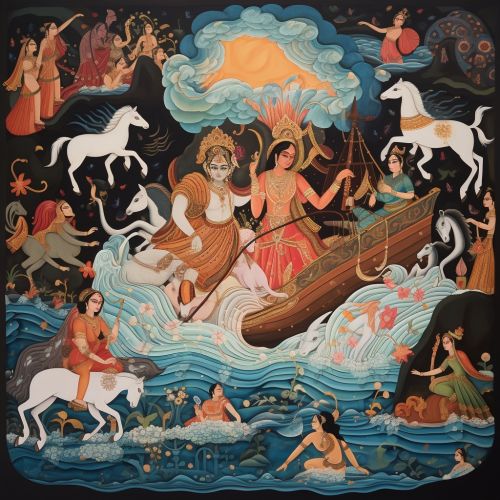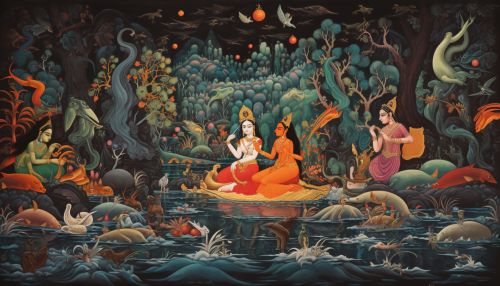Hindu Mythology
Introduction
Hindu mythology is the collection of traditional narratives related to Hinduism, which includes a variety of myths, legends, and folktales. These stories, derived from ancient Indian texts like the Vedic literature, Puranic scriptures, and epics, form an integral part of the cultural and religious fabric of Hindu society. They provide insights into the religion's beliefs, practices, and philosophical concepts, and offer a rich tapestry of deities, heroes, and cosmic events.


Origin and Sources
Hindu mythology has its roots in the ancient Vedic civilization and has evolved over millennia. The primary sources of Hindu mythology are the Vedic texts, the Upanishadic literature, the Puranas, and the two great Indian epics, the Mahabharata and the Ramayana. These texts, written in Sanskrit, contain a wealth of stories, hymns, and philosophical discourses that form the basis of Hindu mythology.
Deities
Hindu mythology is populated by a vast pantheon of gods and goddesses, each with their unique characteristics, attributes, and stories. The deities are often grouped into the Trimurti or the triad of Brahma, Vishnu, and Shiva, representing the cosmic functions of creation, preservation, and destruction, respectively.
Brahma
Brahma, the creator god, is often depicted with four heads and four arms, symbolizing his omnipresence and omnipotence. Despite his significant role, Brahma is not widely worshipped in contemporary Hinduism.
Vishnu
Vishnu, the preserver, is known for his ten avatars or incarnations, which he assumes to maintain cosmic order. These include Rama and Krishna, central figures in the epics Ramayana and Mahabharata, respectively.
Shiva
Shiva, the destroyer, is a complex deity with contrasting characteristics. He is both a yogi living in seclusion and a householder with a wife, Parvati, and two sons, Ganesha and Kartikeya. Shiva is also associated with the cycle of destruction and recreation, symbolizing the cyclic nature of the universe.
Myths and Legends
Hindu mythology is replete with myths and legends that serve to illustrate moral, ethical, and philosophical principles. These stories, often involving gods, goddesses, and heroes, are deeply embedded in the collective consciousness of Hindu society.
Creation Myths
There are several creation myths in Hindu mythology, reflecting the religion's complex and diverse nature. One such myth from the Rigveda describes the universe's creation from the sacrifice of the primal man, Purusha.
Heroic Legends
Heroic legends form a significant part of Hindu mythology, with characters like Rama and Krishna embodying the ideal virtues of dharma (righteousness), courage, and wisdom.
Symbolism and Interpretation
Hindu mythology is rich in symbolism, with deities, myths, and rituals embodying deeper philosophical and metaphysical truths. The stories are not meant to be taken literally but are allegorical, serving as a medium to convey complex spiritual concepts.
Influence on Culture
Hindu mythology has profoundly influenced Indian culture, shaping its art, literature, music, dance, and architecture. The myths and legends have been depicted in various art forms, from temple sculptures and paintings to classical dance and drama.
